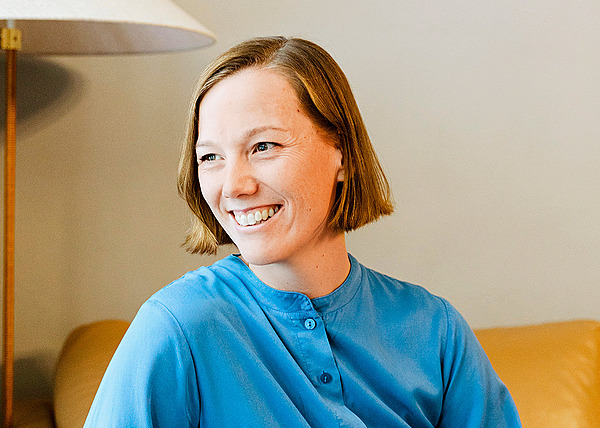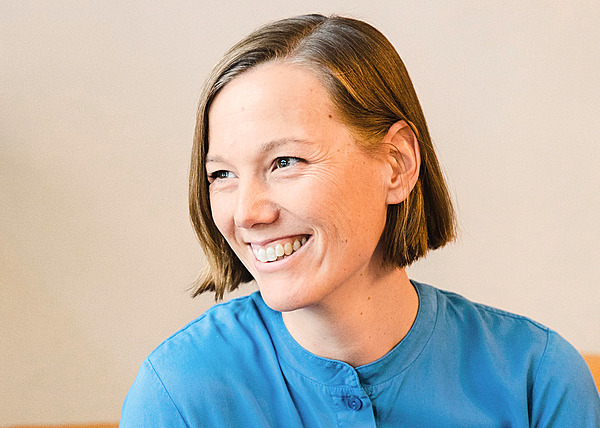
Academic of the Year Lotta Kaila: ”Social discourse is about persistence”
As a result of Lotta Kaila’s active social discourse, pollinator exposure to pesticides has become a topic of discussion in Finland. That has required the Academic of the Year to put herself out there.
Text katja alaja images milla talassalo english translation marko saajanaho
Wonderful! That is how Lotta Kaila felt when she was chosen as the Academic of the Year award recipient. The award was based on her highly goal-oriented, active, and tangible way to communicate her research. Kaila, who studied the effects of pesticides on pollinator populations in Finland, defended her doctoral dissertation at the Faculty of Agriculture and Forestry of the University of Helsinki in November 2023.
“The award feels good because I’ve spent a lot of time thinking if my messaging works and if I’m reaching the target audiences I want. After all, I’ve communicated and discussed my research very differently from what traditional scientific communication is used to”, Kaila ponders.
In addition to the traditional announcements upon starting and finishing her dissertation, she has actively communicated and interacted on social media throughout the research process, especially on X, the messaging service formerly known as Twitter. She has wanted to inspire other researchers, officials, farmers, pest control businesses, and the public to talk about pesticides and fighting biodiversity loss.
You may remember, for example, Kaila’s video of a bumblebee that knows to roll a yellow ball while leaving a red ball alone. Colour vision guides bumblebees to unpollinated flowers.
Showing fallibility was uncomfortable
In addition to her social media messaging, Kaila has written columns and articles across a variety of media, talked to people at functions – and even appeared in a documentary.
In the documentary Kuningattaren kuolema (“Death of a Queen”), directed by Riikka Kaihovaara and produced by Yle, Kaila got the opportunity to discuss her work, including all the laughter and tears. Finns got to see that research is a process with inherent uncertainty – bumblebees did not behave in the field and the lab as Kaila had predicted, forcing her to develop new research methods.
“The documentary showed human fallibility and gaining new insight in new research. I felt uncomfortable with it at first, but it has also been valuable based on my research colleagues telling me how they can relate”, Kaila says.
Bee mass death led to research
‘Hmm, this mass death of bees is certainly odd’, thought Kaila while working as a Senior Officer at Tukes, the Finnish Safety and Chemicals Agency, in 2015. She realised there was not enough information about the environmental residues and effects of pesticides on pollinators. That acted as a spark for Kaila’s doctoral research.
“In Finland, we have this idea that Finnish food is clean. Yes, Finnish food contains less pesticides compared to many EU countries, but that doesn’t mean the Finnish environment is clean”, Kaila points out.
This example shows Kaila’s skill in combining the familiar and the new in a memorable way when she speaks.
“I feel it’s very important to communicate and create change. We have no time to grumble why nobody’s doing anything.”
Lotta Kaila, Academic of the Year
It was immediately clear to Kaila that she wanted to facilitate biodiversity through science. For that reason, she sought funding from the Maj and Tor Nessling Foundation, which requires participation in social discourse.
“I feel it’s very important to communicate and create change. We have no time to grumble why nobody’s doing anything.”
Tips for scientific communication for a new age
Kaila has thought extensively about how to change the world through science. Indeed, she can give us a number of excellent tips. When phrasing your messages, preaching is firmly on the “do not” list because it does not activate listeners. In addition, you want to consider what different audiences find interesting and what motivates them.
“Instead of warning farmers and telling them what not to do, I tried to get them to consider the farm from the pollinators’ point of view. I reminded them that wild plants like thistles and dandelions are not merely weeds but also important food plants for pollinators. I urged the farmers to consider if the flights from flower to flower on the farm were short enough for pollinators and if there were flowers from early spring to late autumn,” Kalla tells us.
She remembers a moment when one farmer came up to her after a speech and said they maybe would not remove dandelions as actively from there on.
”It’s also comforting to know communication is not simply based on your nature – you can learn, as long as you’re prepared to work for it.”
Lotta Kaila, Academic of the Year
Kaila also believes in careful formatting of messages, as well as visual communication such as graphs. The grant she received from the Maj and Tor Nessling Foundation allowed her to order assistance for this.
“I have my tweets and texts read by people from different backgrounds, such as my work colleagues, my spouse, and my mother. Carefully crafting one message takes a lot of work, so I don’t post every day. I’ve been told communication comes naturally to me. That isn’t true, as it actually takes plenty of preparation and learning. It’s also comforting to know communication is not simply based on your nature – you can learn, as long as you’re prepared to work for it”, Kaila acknowledges.
Legislation arguments are needed
At the start of this year, Kaila returned to Tukes and sustainable use of plant protection products – the boundary of legislation and research, as she puts it. As Senior Officer, she facilitates the use of these chemicals in accordance with EU regulations.
“We already know a lot about how pesticides affect pollinators, but we’re still missing plenty of information from the Finnish conditions in particular. Researchers and officials must produce this information together to ensure the results further the development of legislation. I am persistent when it comes to furthering that cause.”
At some point in the future, Kaila plans to return to research work.
Lotta Kaila

Education: Doctor of Agriculture and Forestry, 2023. Her dissertation revealed, for example, that pesticide concentration smaller than EU-studied lethal doses can weaken pollinator populations in the long term. The thesis can be read on Helda.
Work: Senior Officer. Promotes deploying the Sustainable Use of Plant Protection Products programme in Finland.
What are you known for in your work community at Tukes? I made beer myself for the Tukes Christmas party and named it #rohkeastikokeillen, or #proudlyexperimental, according to the Agency’s values. Admittedly, the recipe was quite proudly experimental, and those who enjoyed the end result had a somewhat twisted sense of taste.
What are you not known for? Patience may not be the greatest of my virtues.